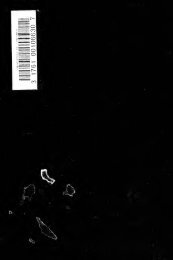Chau Ju-Kua - University of Oregon Libraries
Chau Ju-Kua - University of Oregon Libraries
Chau Ju-Kua - University of Oregon Libraries
You also want an ePaper? Increase the reach of your titles
YUMPU automatically turns print PDFs into web optimized ePapers that Google loves.
1 52 BESI (?), SUMATRA. 1,38,4-5<br />
Marsden, Hist, <strong>of</strong> Sumatra, 262, note, remarks: kTIH witliin a few years the Lampoon<br />
people (island <strong>of</strong> Samanlia, in the Straits <strong>of</strong> Sunda) believed the inhabitants <strong>of</strong> the island Engano<br />
to be all females, who were impregnated by the wind; lilte the mares in Tirgil's Georgics. They<br />
styled them, in the Malay language. Ana Saytcm, or imps <strong>of</strong> the devil)). Col. Kenneth Mackay,<br />
Across Papua, 70, says that the natives <strong>of</strong> the Trobriand Isl-ands <strong>of</strong>f the east coast <strong>of</strong> New Guinea, 5<br />
have a curious creation myth, according to which the first human beings were three maidens<br />
who conceived by the rain falling on them.<br />
The legend <strong>of</strong> an island <strong>of</strong> women somewhere in the Malay archipelago was known to the<br />
Arabs in the tenth century, see Devic, Livrcdes merveilles de I'Inde, 20—29.<br />
On the notion <strong>of</strong> the waters <strong>of</strong> the Ocean flowing downward, see supra, pp. 26, 75, 9. tO<br />
2) The island in the Western Ocean inhabited by women and its relations with Fu-lin are<br />
mentioned by Htian-tsang in his account <strong>of</strong> Persia, Beal, Records, II, 279, also in T'ang-shu,<br />
221B,6a. Cf. Hirth, China and Soman Orient, 84,200—202. Western mediaeval writers also refer<br />
to it; Marco Polo, places it some 500 miles south <strong>of</strong> the Mekran coast. See Yule, Marco Polo,<br />
11, 395—398, and Friar Jordanus, Marvels (Hakl. Soc. edit.), 44. 15<br />
There were, according to the Chinese, other countries <strong>of</strong> women, in Tibet and Central<br />
Asia, see Rockhill, Land <strong>of</strong> the lamas, 339—341. The P'o-wu-chi (|^ m\ ^), <strong>of</strong> the middle<br />
<strong>of</strong> the sixth century, mentions a country, or island, to the east <strong>of</strong> a place called Wu-tsu (^ Sfl.)><br />
in the Great Ocean which was inhabited solely by women.<br />
5. Best (?). Sumatra. 20<br />
Po-ssV(^ Ijf).<br />
«The country <strong>of</strong> Po-ssi is above the countries <strong>of</strong> the south-west. The<br />
inhabitants are <strong>of</strong> a very dark complexion and their hair is curly. They<br />
wrap around their bodies cotton cloth with green (or blue) flowers (or spots),<br />
and wear golden circlets on each arm. They have no walled cities. 05<br />
«Their king holds his court in the morning, when he sits cross-legged on<br />
a divan covered with tiger skins. When withdrawing from his presence, his<br />
courtiers make their obeisance by kneeling down. When going out, the king<br />
sits in a hammock (|^ ^), or rides an elephant, followed by a body-guard<br />
<strong>of</strong> over an hundred men carrying swords and shouting. The people eat cakes 30<br />
<strong>of</strong> flour, and meat; the food is put in earthenware vessels, from which they<br />
help themselves with their hands.<br />
Note.<br />
This is a quotation from Ling-wai-tai-ta, 3,6''. Our author has slightly changed the<br />
wording <strong>of</strong> the first phrase, which, in the original, reads nThe country <strong>of</strong> Po-ssi is above (or «on» 35<br />
t" ) tte south-western Ocean)). Po-ssi in Chinese mediaeval works is usually Persia here it<br />
seems to be some country or tribe <strong>of</strong> south-eastern Asia, inhabited by Negritos; we might expect<br />
to find it in or near the Malay Peninsula. Gerini, Researches, 429, 679, 681—682, arrives at<br />
the conclusion that the Po-ssi <strong>of</strong> our text, is doubtless the same as de Barros' Lambrij, which<br />
adjoins Daya, which, in turn, adjoins Acheen. oThe name itself, he says, may be Lambesi, i. e., 40<br />
Besi or Basi — lam being merely the ordinary prefix meaning village — a petty state on the<br />
homonymous river on the west coast <strong>of</strong> Sumatra immediately belor/Acheh, upon which it borders)).

















